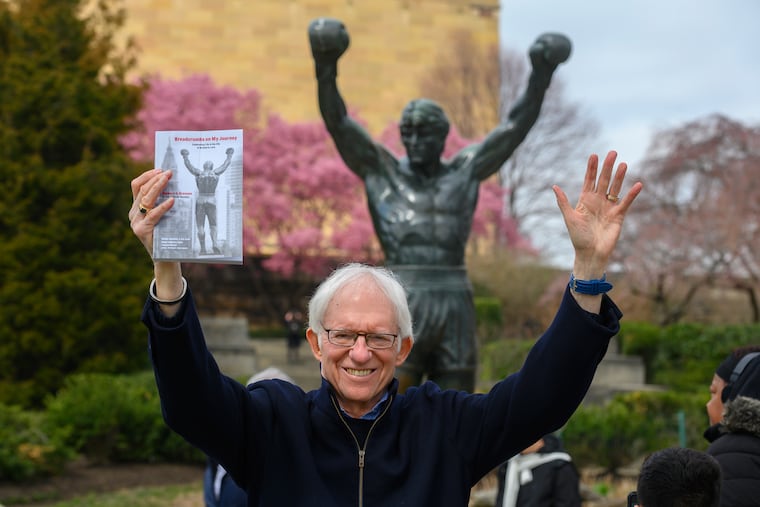Philly insurance salesman will sell you his memoir about his unremarkable life. Aggressively.
“I do like when he’s creative in his sales,” said Richard Krassen’s wife, Carole Cohn. “But I do not like when he’s pushy.” And Krassen can be super pushy.

Celebrities write memoirs. Interesting people tell their life stories. People like former President Barack Obama and actor Michael J. Fox, whose memoirs were released this month.
But Richard Krassen?
Krassen, who turns 80 on Nov. 17, is a semiretired life insurance salesman, and you have never heard of him. And when he wrote his life story, the story of an unremarkable middle-class Jewish existence in Northeast Philadelphia, he didn’t care if nobody wanted to read it.
Because he was going to sell it. Like a whole-life policy. His book, Breadcrumbs on My Journey, published by Legacy Projects, is just another product that people didn’t know they wanted until he pushed them, desperately and obsessively.
“He’s still selling life,” said his ghostwriter David Tabatsky. “He’s selling his life.”
Krassen brags about his book’s numbers. Since it was published in February 2019, he said, he’s sold nearly 1,500 copies at $20 apiece.
“Find me a no-name, self-published author who sold more,” he said.
Krassen’s second wife, Carole Cohn, said the point of the book wasn’t for strangers to get to know him.
“He just wants to sell the book,” said Cohn, possibly her husband’s biggest fan.
Retirement to many people, she said, is a time for goals and hobbies that came second to raising a family.
“He doesn’t have that,” she said. “He has this.”
“I do like when he’s creative in his sales,” she added. “But I do not like when he’s pushy.”
And Krassen can be super pushy.
Before the pandemic, he would thumb through the obituaries in the Sunday Inquirer, searching for familiar names. He’d plug the names of next of kin into Google, and call their listed numbers. He’d tell them about his 300-page tome, and the deceased’s sometimes vague connection to it, and ask them to buy one.
He would hand his business card to strangers at the movies, or to employees of high-end menswear stores, and ask them to buy his book. He’s suggested that a car dealership hand out copies with every car they sell. He said he was temporarily kicked off Facebook for being too aggressive with his sales pitch on private pages.
He found the phone extension for actor Kevin Bacon’s brother, New York University professor Michael Bacon. Krassen reminded Bacon about his days playing in a jug band with Krassen’s brother-in-law, Robert Levin, and suggested buying a book. Bacon mailed $20. Krassen said he met one of the last surviving Tuskegee Airmen at a funeral. The Philadelphia native has a copy.
He calls each buyer a “breadcrumb.”
“I call them and try to motivate them to want to read it,” Krassen said.
Before the pandemic, he toured the region on his self-booked speaking tour in which he elbowed himself and his book onto community-events calendars.
“It’s all about growing up in Philadelphia,” said Krassen, who now lives in Center City. "I’m selling memories. I don’t think [my life] is unusual. It was never, ‘Look at me, I’m wonderful.’ I tried to represent one person growing up in a certain time, that’s all.”
Krassen grew up in an Oxford Circle rowhouse. He attended Lincoln High School in Holmesburg and graduated in 1962 from the University of Pennsylvania’s Wharton School.
His is a story about the lonely upbringing of an anxiety-ridden kid who measured himself in pickup basketball games. A story about an insurance salesman who married his first wife at a young age, who fathered three boys without a dream-career path, and who found himself as a provider without many options.
In his 20s and early 30s, he was unsure of himself, having failed a personality test as part of a job application for a big insurance firm. He wasn’t aggressive enough to succeed at the next level, they said.
“I was intimidated by very successful people,” he said.
Not anymore.
Earlier this year, just before Philadelphia was shut down by the pandemic, he spoke to a Jewish women’s group in Somerton. They nibbled on black-and-white cookies and listened to him try to connect with their memories: names of middle-school teachers and long-closed stores.
He attended S. Solis-Cohen Elementary School in Castor after its completion in 1948.
“Anyone know Solis-Cohen?” Krassen asked. Hands went up.
“The first school I went to was Carnell,” he said, referring to Laura H. Carnell Elementary School in Oxford Circle.
“Anybody go to Carnell?” Hands went up.
Krassen admonished some of the women for talking during his presentation, but they answered his questions and asked a few of their own.
After his sales pitch, he sat at a folding table piled with books and black felt-tip pens.
Attendee Lynne Kramer bought a book.
“I grew up in Oxford Circle, so I could relate to a lot of things that he was talking about,” she said. “I had similar incidents, but ordinarily I wouldn’t have thought about that stuff.”
That day, he sold a total of six books, signing each with a variation of “Thanks for sharing my dream.”
During the pandemic, his book sales have slowed. He can’t motivate people in person, and he’s had mixed results with social media messages and cold calls.
Still, this Philadelphian finds purpose in not so much sharing as selling his life story — day after day, striving to prove that his most ordinary journey has extraordinary value.
“Now,” Krassen said, “I’ve got something to live for.”